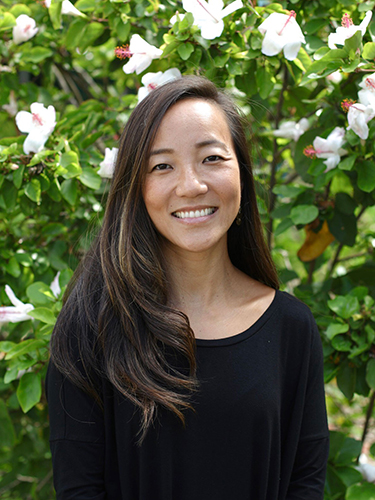Professor & Associate Director
chungjae@hawaii.edu | (808) 956-4548 | Biomed D-103B
Specialization Head: Social and Behavioral Health Sciences
Social and Behavioral Health Sciences
Academic Degrees
- DrPH (Community-Based and Translational Research), University of Hawai‘i at Mānoa
- MPH (Social and Behavioral Health Sciences), University of Hawai‘i at Mānoa
- BA (Biology and Psychology), Gonzaga University
Courses Taught
- PH 623 – Introduction to Health Promotion Theory and Methods (3)
- PH 704 – Community-Based Participatory Research (3)
- PH 771 Teaching Practicum (3)
Research Interests
Dr. Jane Chung-Do’s research interests focus on enhancing youth and family wellness in rural and minority communities across the State of Hawai’i. Topics of past research projects include interpersonal youth violence, gender violence, school connectedness, suicide, and child abuse and neglect through primary prevention efforts and strength-based approaches. Dr. Chung-Do is specifically interested in promoting community-university partnerships to strengthen community-based participatory research and culturally-based programming. As a Robert Wood Johnson Foundation Interdisciplinary Research Leaders Fellow, her current research focuses on promoting healthy eating habits through the development and implementation of a family-based backyard aquaponics programming called MALAMA (Mini Ahupua’a for Lifestyle And Mea’ai through Aquaponics) in rural Native Hawaiian communities (https://www.malamaaquaponics.org/). Dr. Chung-Do is also a co-founder of the Waimānalo Pono Research Hui, which is a grassroots group that aims to promote community-driven and culturally grounded research and programming.
Selected Publications
Chung-Do, J. J., Ho-Lastimosa, H. I., Herrera, S., Jr. Ho, K., Hwang, P., Radovich, T., Albinio, L., Rogerson, I., Keli‘iholokai, Deitschman, K., & Spencer, M. S. (2019). Pono Research: Promoting Native Hawaiian Wellness through Culturally-Grounded and Community-Driven Research and Programming. American Journal of Community Psychology, 0, 1-12. DOI 10.1002/ajcp.12355
Ho-Lastimosa, H. I., Chung-Do, J.J., Hwang, P., Radovich, T., Rogerson, I., Ho, K., Kaholokula, J. K., Spencer, M. S. (2019). Promoting Ahupua‘a Health through Backyard Aquaponics with Native Hawaiian Families. Global Health Promotion, 26(Supp 3), 87-92. DOI: 10.1177/1757975919831241.
Keaulana, S., Chung-Do, J. J., Ho-Lastimosa, I., Hwang, P. H., Ho, Kenneth, Radovich, T., & Spencer, M. S. (2019). Waimānalo Pono Research Hui: Establishing protocols and rules of engagement to promote community-driven and culturally-grounded research with a Native Hawaiian community. British Journal of Social Work, 49 (1023-1040). doi: 10.1093/bjsw/bcz012.
Yang, K., Chung-Do, J, Fujitani, L., Foster, A., Mark, S., Okada,Y., Saad-Jube, Z., Youkhana, F., Braun, K., Cassel, K., Helm, S., Kaopua, L., Mataira, P., Nishita, C., Okamoto, S., Sy, A., Townsend-Ing, C., Qureshi, K. & Umemoto, K. (2019). Advancing Community-Based Participatory Research to Address Health Disparities in Hawai‘i: Perspectives from Academic Researchers. Hawai‘i Journal of Medicine and Public Health, 78(3), 83-88.
Chung-Do, J., Bifulco, K., Antonio, M., Tydingco, T., Helm, S., & Goebert, D. (2016). Cultural analysis of the NAMI-NH ConnectSuicide Prevention Program by rural community leaders in Hawai‘i. Journal of Rural Mental Health, 40(2), 87-102. http://dx.doi.org/10.1037/rmh0000044
Chung-Do, J., Look, M., Usagawa, T., Trask-Batti, M., Burke, K., & Mau, M. (2016). Engaging Pacific Islanders in research:community recommendations. Progress in Community Health Partnerships: Research, Education, and Action, 10(1), 63-71.
Chung-Do, J., Goebert, D. A., Bifulco, K., Tydingco, T., Alvarez, A., Rehuher, D., Sugimoto-Matsuda, J., Arume, B. & Wilcox, P.(2015). Mobilizing rural and minority communities for youth suicide prevention. Journal of Health Disparities Research and Practice,8(4), 108-123.
Chung-Do, J., Goebert, D., Chang, J., & Hamagani, F. (2015). Developing a comprehensive school connectedness scale for programevaluation. Journal of School Health, 85(3), 179-88. doi:10.1111/josh.12237.

